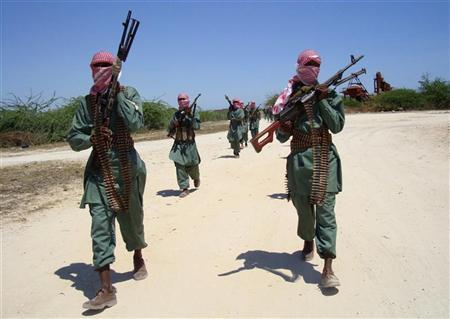 In a statement, the interim Somali government last week accused the Eritrean authorities of sending two plane-loads of weapons to Somalia in violation of UN arms embargo on that war-ravaged country. The Somali government alleged that two planes from Eritrea landed at an Al-Shababa controlled airstrip in Lower Shebelle Region in Southern Somalia on April 28 and May 1. Voice of America says the accusation is a repeat of events in 2007, when the United Nations said Eritrea was secretly sending arms and missiles to Al-Qaeda-linked al-Shabab.
In a statement, the interim Somali government last week accused the Eritrean authorities of sending two plane-loads of weapons to Somalia in violation of UN arms embargo on that war-ravaged country. The Somali government alleged that two planes from Eritrea landed at an Al-Shababa controlled airstrip in Lower Shebelle Region in Southern Somalia on April 28 and May 1. Voice of America says the accusation is a repeat of events in 2007, when the United Nations said Eritrea was secretly sending arms and missiles to Al-Qaeda-linked al-Shabab.
In a BBC interview, Eritrea’s Information Minister Ali Abdu, was quick to declare that his government did not recognize the existence of the UN backed provisional Somali government. Ali flatly denied the allegations of shipment of weapons. Eritrea’s interest in Somalia is mainly driven by the desire to weaken Ethiopian influence in the country.
The Iranian issue is dangerously stickier for Isayas. By having Iranian forces in the Assab Red Sea Port, Eritrea may wish to send warning signal to some Ethiopian circles entertaining the idea of retaking the port in the future. But that message is of little or no significance to Israel or the US if it meant having nuclear ambitious Tehran installing missiles and intelligence facilities on the strategic Assab Port overlooking the Bab-el-Mandeb Strait and the Gulf of Eden. It is unlikely such an arrangement would be tolerated.
Presidential Aide, Yemane Ghebremeskel denied Iran had a military base at Assab and blamed Israel for engaging in “disinformation campaigns.”
Exiled Eritrean civic and political opposition leaders have offered no clear and strong message so far on the looming crisis over apparent Iranian involvement. They seem to be in disarray as they were last year when Washington was considering putting travel and financial restrictions on the Isayas government by first placing it on its list of terror sponsoring states. Nothing could be more despairing for poverty stricken, terrorized and voiceless population than to have a weak, toothless opposition.